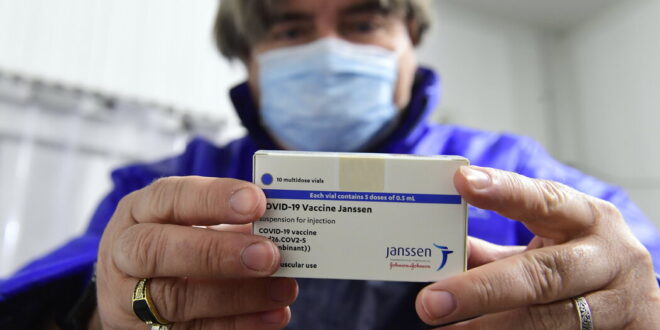Johnson & Johnson on Tuesday said it would delay the rollout of its vaccine in Europe amid concerns over rare blood clots found in recipients in the United States, just as several countries of the bloc were poised to start administering the vaccine later this week.
It was another blow to the continent’s ambition to ramp up inoculation campaigns that have lagged behind other countries in the West. The European Union had expected the vaccine to boost its efforts to vaccinate 70 percent of adults by September.
“The safety and well-being of the people who use our products is our number one priority,” Johnson & Johnson said in a statement when it announced its plans to delay the rollout of the vaccine, adding that it had been reviewing the cases of blood clots detected in the United States with European health authorities.
On Tuesday, United States health officials called for a pause in the use of the Johnson & Johnson single-dose coronavirus vaccine after rare blood clotting was reported in six recipients — women between the ages of 18 and 48 who developed symptoms within one to three weeks of vaccination. One woman died and a second woman has been hospitalized in critical condition. More than 40 states quickly paused or recommend that providers pause administration of the dose.
Nearly seven million people in the United States have received Johnson & Johnson shots so far, and about nine million more doses have been shipped out to the states, according to data from the Centers for Disease Control and Prevention.
Following the decision in the United States, South Africa also announced it would pause vaccinations, even as the Johnson & Johnson shot is the only one currently offered in the country. So far, the vaccine has been administered to about 290,000 health workers.
The country’s health minister, Dr. Zwelini Mkhize, said the pause was precautionary, and he expected the rollout to resume in a few days after authorities investigated the cases.
“Science must be respected at all times, although this may mean a disruption in our plans,” Mr. Mkhize said on Tuesday. The country has also secured 30 million doses of the Pfizer-BioNTech vaccine, two million of which will arrive by May, the minister said.
In Europe, the first signs of concern came last week when the European Medicines Agency, the bloc’s drug regulator, said it was investigating reports of four cases of blood clots in people who had received a shot of Johnson & Johnson’s Janssen vaccine in the United States, one of them being fatal. The regulator said it wasn’t clear if there was a link between the vaccine and the clots, adding that it treated the reports as “safety signal” that required further assessment.
Johnson & Johnson started delivering its one-shot vaccine to the bloc on Monday, with some member countries like Spain and Belgium already having received modest quantities of the shot, and preparing for the rollout later in the week. Fifty-five million doses of Johnson & Johnson’s vaccine are expected to be delivered to the European Union by the end of June, and another 120 million later in the year, according to Thierry Breton, the bloc’s top industry official.
What You Need to Know About the Johnson & Johnson Vaccine Pause in the U.S.
Europe has been embroiled in a regulatory back-and-forth over another vaccine, AstraZeneca’s. Several countries have restricted the use of the vaccine in younger people, after the European Medicines Agency said there was “a possible link” between blood clots and the vaccine earlier this month, and said it should be listed as a rare side effect.
Both Johnson & Johnson and AstraZeneca use the same technology, prompting concerns that the blood clots reported in recipients of both vaccines could be the same rare, yet sometimes fatal side effect.
The agency stopped short of advising to curb the use of the vaccine in 27 member countries, saying that it was up to the national authorities to decide who should receive which vaccine, which resulted in a patchwork of different national regulations.
France and Belgium have restricted its use for those older than 55, and Germany, Italy and Spain, for those over 60. Some other countries, such as Poland, which rely heavily on AstraZeneca in their national rollouts, decided to go ahead with AstraZeneca’s vaccine.
Eileen Sullivan contributed reporting.
 Top Naija News: Nigerian News, Breaking News Nigeria and World News Top Naija News is a daily news publication in Nigeria, delivering the latest breaking news in Nigeria and around the world.
Top Naija News: Nigerian News, Breaking News Nigeria and World News Top Naija News is a daily news publication in Nigeria, delivering the latest breaking news in Nigeria and around the world.




